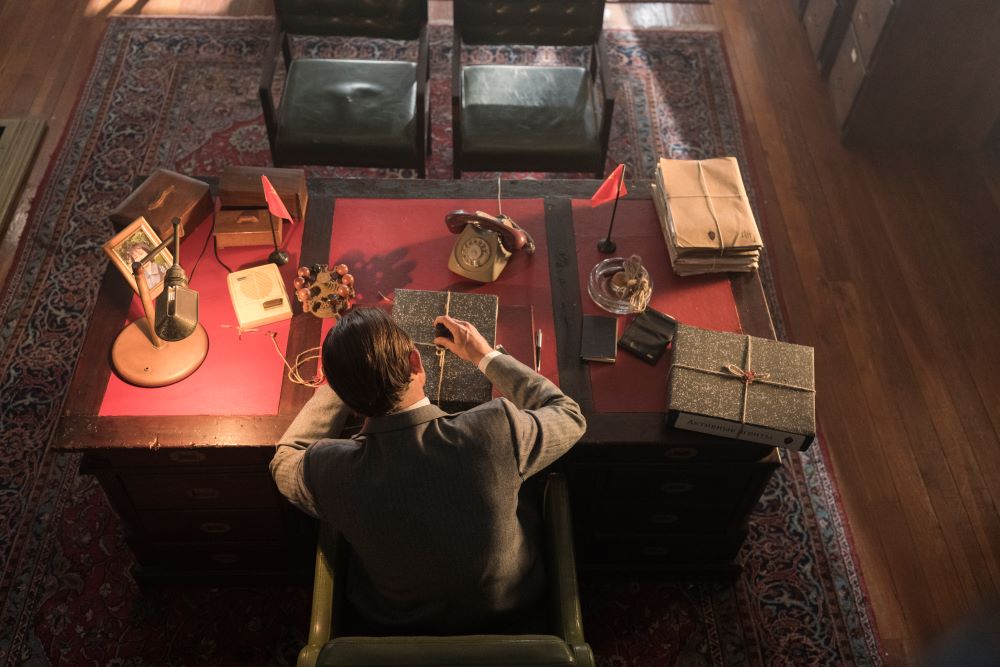OU News
News from The Open University
- Home
- Secrets, spies, and the nuclear war that was avoided
Secrets, spies, and the nuclear war that was avoided
Posted on • TV and radio

This latest Open University/BBC co production is something you might find from the pages of a thriller novel – but it’s a portrayal of real events that depict how a Soviet double agent helped the West avoid a nuclear war with Russia in the 1980s.
The three-part dramatization series Secrets & Spies: A Nuclear Game, shows how that war was averted. It airs at 9pm on BBC Two, Wednesday, 8 May, and is available on iPlayer thereafter.
The backdrop to the first episode is that US President Ronald Regan has delivered an historic speech in the Houses of Parliament and declares the Soviet Union belongs on the ‘ash heap of history.’
Since he also had a strong bond with British Prime Minister Margaret Thatcher this fed the paranoia of the Soviet Union’s KGB chief Yuri Andropov, who later becomes Russia’s leader.
Launch codes at the ready
The programme features two opposing spies, both double agents: the KBG Soviet agent Colonel Oleg Gordievsky, who reports directly to Andropov, and MI5 agent Michael Bettaney.
Later in the episode, we find out how the paranoia of Andropov is stoked by a routine NATO exercise called Abel Archer, a war game where the Western Forces rehearse how they would manoeuvre in the event of an attack. As a result, Russia’s leader is ready with his own nuclear launch codes.
What follows is five days of tension as Gordievsky warns the British of an escalating risk, which no one can quite believe.
Rare archive interviews
The episode includes rarely heard archive interviews with Gordievsky, and the unpublished letters of Bettaney, as well as interviews with former aides to Margaret Thatcher and Ronald Reagan, and interviews with former KGB, MI5 and MI6 officers, some of whom have never spoken publicly before.
It also encompasses the British public protests against American nuclear weapons at Greenham Common, something that Open University’s Senior Lecturer in Contemporary International History, Dr Luc-Andre Brunet was consulted on by the programme makers.
He said:
“I felt it was important for the series to highlight how ordinary citizens felt about Cold War tensions and the likelihood of nuclear war in the early 1980s. This was a time when hundreds of thousands of people marched in London to protest against nuclear weapons and call for more dialogue between East and West. This is an important part of the story if we want to understand the actions of leaders like Thatcher and Reagan.”
Extraordinarily, the Abel Archer exercise wraps up without incident and without the West realising how close the world came to nuclear war. The remaining episodes contain just as much intrigue and danger.
This series was commissioned by Broadcast and Partnerships and is supported by the Faculty of Arts and Social Sciences with particular relevance to:
Q01 | BA (Honours) History | Open University,
Q97 | BA (Honours) History and Politics | Open University, and
Q45 | BA (Hons) Politics Philosophy and Economics (open.ac.uk)
- Commissioned by Dr Caroline Ogilvie, Director, Broadcast and Partnerships
- Academic Consultant/s: Dr Geoff Andrews and Dr Luc-Andre Brunet
- Media Fellows: Joanna Paul / Emily Bullock / Alison Penn / Zoe Walkington
- Broadcast Project Manager: Poppy Ross
- Supporting Online Content: Steff Easom
Supporting Online content:
Visit our Broadcast and Partnerships site OU Connect where you can find an interactive on spycraft through the decades.
(NB: this site may not be live or complete prior to broadcast)
Image copyright: Raquel Fernandes/ BBC Studios